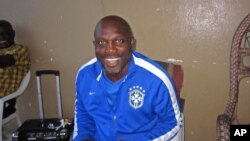Liberian football legend George Weah of the opposition Congress for Democratic Change (CDC) party is expected to accept a petition from his supporters Thursday to run for president in the coming 2017 general elections.
Weah, who is now a first-term senator for Montserrado County, first ran for president in 2005 and came second to President Ellen Johnson Sirleaf. He ran again in 2011, this time as a vice president to Winston Tubman and again his party came second to Sirleaf.
Nathanial McGill, national chairman of the CDC, said the 10-year administration of President Sirleaf has failed to improve the welfare of Liberians in spite of the enormous international goodwill it has received.
As a result, McGill said “marginalized” Liberians yearn for change, and they believe Senator Weah can be the vehicle for that change.
“Considering that the Unity Party-led government has not done sufficient in the face of the enormous resources it has received, we think there’s a need for change. Liberians believe Senator Weah can be the vehicle for that change. He’s a man who understands their condition, who indeed understands their plight,” he said.
McGill said two million people are expected to follow the petition rally on radio.
Some analysts have commented that the CDC lost the last two presidential elections because, while the party was popular in urban areas like the capital, Monrovia, it failed to extend its reach to the rural areas.
McGill described the assertion as a myth. He said the only political party with national appeal is the CDC. “If we are a Monrovia-based party, how come we pushed this president to the second round in two successive elections? The fact that the government did not win on the first ballot shows we are not a Monrovia-based party. We are a national-based party,” McGill said.
He also said the CDC hopes to improve on its errors in the last two elections. “We realize that we needed to improve our ability to man the polls and in that area we had some lapses. But we’ve improved on that, manning the polls making sure we have a strong and vigorous poll monitoring officers. And we are quite sure that this time around there will be no reason to complain because we will be on top of our game,” McGill said.
Following the November 2011 first-round presidential election, the CDC decided to boycott the second-round vote because it felt it had been cheated in the first round.
A rally of its supporters called by the CDC leadership in support of the party’s plan to boycott the runoff election turned violent when police fired on protesters, killing one and wounding several others.
A commission set up by President Sirleaf to investigate the violence recommended, among other things, the dismissal of the director of police.
A number of other Liberians have already announced their intentions to contest the 2017 election. They include Liberia’s incumbent Vice President Joseph Boakai of the ruling Unity Party; Charles Brumskine of the opposition Liberty Party, who ran in the 2005 and 2011 presidential elections and lost; and businessman Benoni Urey, who served as head of the country’s lucrative Bureau of Maritime Affairs during the presidency of Charles Taylor.
Others likely to enter the race include Dr. J. Mills Jones, former governor of the Central Bank of Liberia, and former Foreign Minister Augustine Ngafuan, who resigned last year, saying he wanted to be an “active player” in the coming 2017 presidential and general elections.
McGill said the CDC is contemplating collaborating with other political parties for the 2017 campaign.
“We are thinking of that. That is correct. We believe that the only way we can move this country forward and unite our people is to form some kind of unity government. And to do that you must collaborate and we will pursue that,” McGill said.




